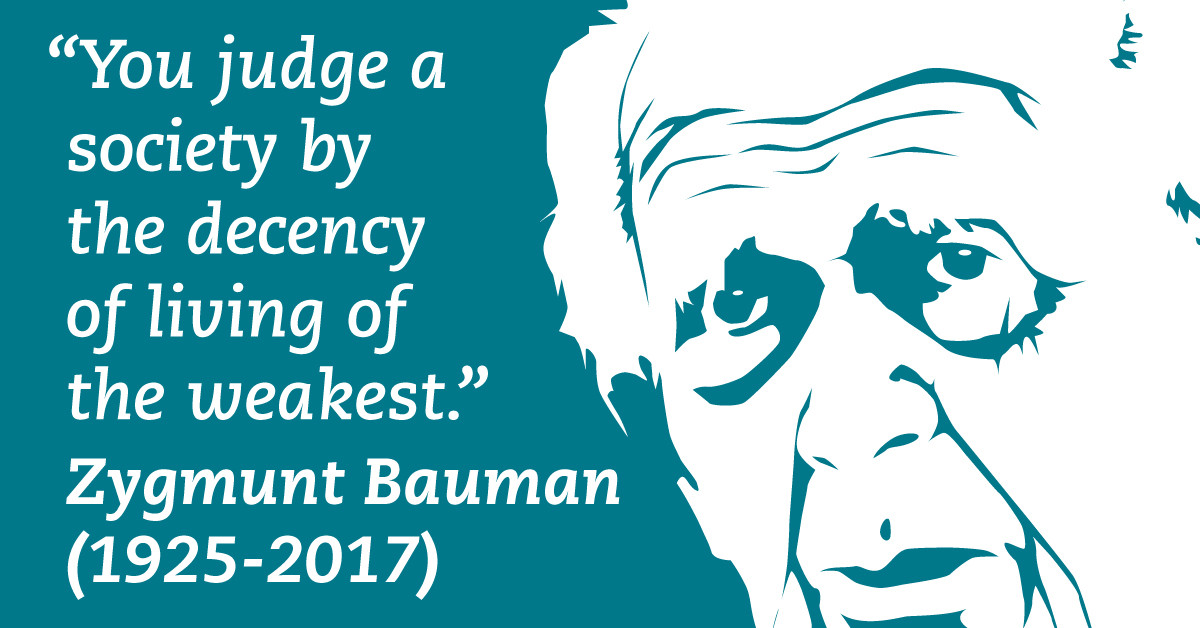Philosopher Zygmunt Bauman, One Year On
Posted by Pete on 9th Jan 2018
Get new post updates here
"I was left-wing, I am left-wing, and I will die left-wing."
Zygmunt Bauman died today last year, a man of his word.
To the very end, he was agitating on behalf of the persecuted and displaced after himself living a life of persecution and displacement. Despite repeated obstacles, he never gave up his struggle for a better world.
Who was Zygmunt Bauman?
Bauman is one of our less well-known tea towel characters so a quick bio is in order.
In 1925, he was born a Jewish Pole in the city of Poznan.
When in 1939 Hitler's Stormtroopers invaded, Bauman and his family fled the Nazis' anti-Semitism to the Soviet Union. Soon after, he enlisted in the Polish forces serving with the Red Army to fight the fascists.
In 1968, after years as a lecturer at the University of Warsaw - in which position he grew more and more critical of Poland's post-war dictatorial regime - he was forced to leave the country again.
The ruling communist party, trying to tackle its legitimacy deficit by appealing to xenophobic nationalism, had created an anti-Semitic purge of the state.
Now out of Poland for good, Bauman soon settled down as Professor of Sociology at Leeds University from where, for the next four decades, he would theorise against the vicissitudes of global capitalism on behalf of its worst-off victims: refugees, the impoverished, war victims.
Quite a life.
Bauman's unbroken resolve
What strikes me most about him is how many good excuses Bauman had to leave the struggle for social justice to someone else, or abandon it altogether.
Firstly, being displaced by the Nazis was an awful experience. If Bauman decided he didn't want anything more to do with the war after fleeing to Russia, you'd think, fair enough. And yet, as soon as he could, refugee Bauman joined up to drive the fascists out of Poland and back to Berlin.
Being hounded out of Warsaw by the communist government in 1968 marked Bauman's second experience of homelessness simply because he was a Jew.
This experience might have made Bauman look very favourably on the idea of the Israeli state, and yet he never stopped supporting displaced Palestinians in their struggle against government oppression.
A lasting voice for the oppressed
In 2009, Bauman's wife, Janina - who herself had a fascinating life story, having lived through the Warsaw Ghetto in occupied Poland - passed away.
But Zygmunt didn't take his grief as cause for retirement. He carried on vocalising for the oppressed. Just months before his death, he was denouncing Europe's response to the influx of refugees from the Global South as a "crisis of humanity".
So many excuses to give up the fight. And that's without even considering the fact he had to live in Leeds for 40 years! (Sorry, I had to say it. I'm from Lancashire...)
In a Britain where too many Leftists - myself included - sometimes use the lightest excuse to get out of a protest or a council meeting, Bauman, the twice-displaced World War 2 veteran, offers us a lesson in what real commitment looks like.
He may - at least for now - be a less recognisable figure than Nelson Mandela or Rosa Parks.
But when people come into your kitchen and ask "who's that bloke with the wiry hair on your tea towel?", you get to tell them the story of Zygmunt Bauman.

